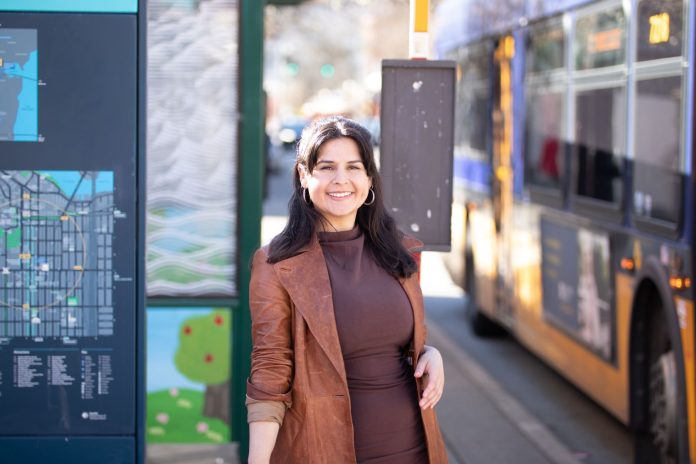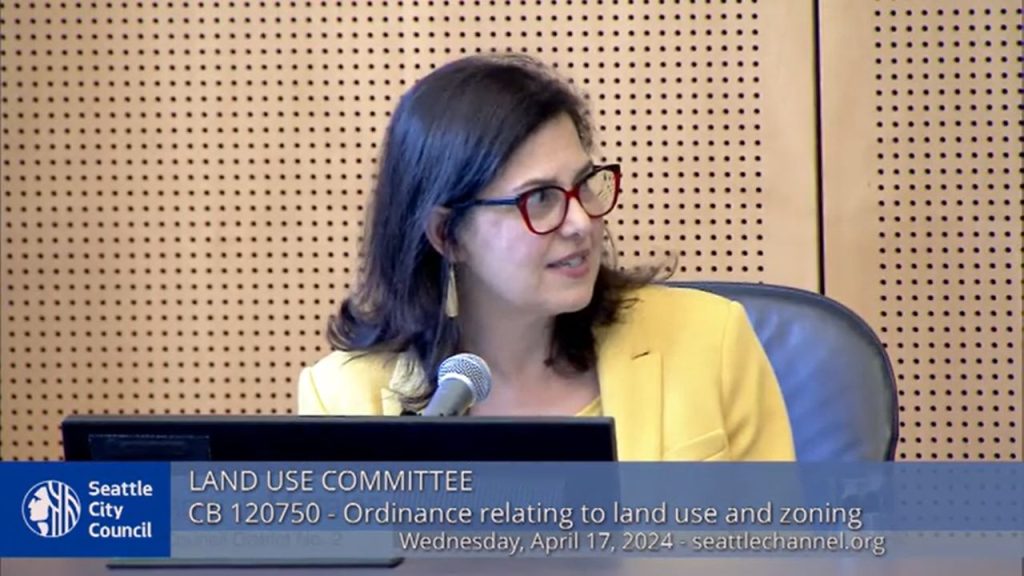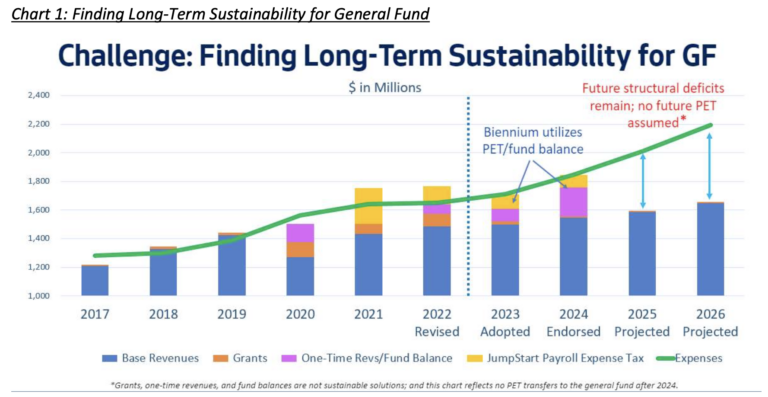
Rinck wants to put a progressive in Teresa Mosqueda’s former seat once more.
The 28-year-old announced her candidacy for the Position 8 citywide Seattle city council seat at the end of March. The race now includes current appointee Tanya Woo as well as progressives Saunatina Sanchez and Tariq Yusuf.
The wheels were set in motion for this rare even-year council election by Teresa Mosqueda winning higher office (the King County Council) in November, vacating her Seattle Council seat. In January, the Seattle City Council appointed Woo as a temporary fill-in, but by City Charter she can only serve until the next general election. Thus, Woo is defending the seat in an even-year, and she does so with strong backing from the centrists on council, high-powered lobbyist Tim Ceis (who rallied support for her appointment), and business leaders.
Referencing her experience educating communities on the influence of money in politics, Alexis Mercedes Rinck said, “I’m of the belief that big business shouldn’t be deciding who represents this city. Woo was appointed by five people. I’m looking to be elected by 200,000 people.”
Why she’s running
What inspired Rinck to run? One of her main influences was her background: her parents were gang-involved youth who dealt with incarceration, substance use disorder, and homelessness. “They were young people who didn’t have the resources they needed to weather the challenges before them and then experienced an abundance of harm at the hands of these systems,” Rinck said. “And it changed the trajectory of their lives.”
She spoke about how she is now able to have a relationship with her father because he was able to enter a transitional housing program that helped him gain stability and obtain certification to build a career as a peer support specialist. Having personally experienced the value of such programs, she is dedicated to strengthening and improving them for everyone.
Raised by her grandparents, Rinck came to advocacy in high school, and since that time, she’s worked on a wide array of issues: no fee ATM initiatives, small claims court education and advocacy, banning hydrofracking in New York State, campaign finance reform, housing, and sanctuary campus and city efforts, among others.
“I’ve been a committed advocate and fighter for justice on so many different fronts,” Rinck said.
After attending university in New York, Rinck moved to Seattle to obtain her Masters degree at the Evans School at the University of Washington. “I think the most valuable part of the education that I got…was really understanding how to work on institutional change,” she said. “I was part of a coalition of students that wanted to see actual anti-racism education implemented and required, especially since they’re the premier institution turning out public servants, and at the time, their ability to educate about the history of racism and policymaking as well as what it means to actually create equitable policy was very limited. We were able to champion a lot of changes.”
Perhaps best known for her time serving as the director of subregional planning and equitable engagement at the King County Regional Homelessness Authority (KCRHA), Rinck spoke enthusiastically about the North King County agreement she shepherded as the example of coalition building she’s most proud of. To build this agreement, she had to convince five cities in North King County to cooperate with the regional approach towards homelessness and fund the Authority. Through focused conversations, listening to these cities’ concerns, and making them feel like true partners in the process, she was able to bring them on board, improving both data collection and the efficiency of service providers.
Now she works for the University of Washington as the assistant director of policy planning and state operations, responsible for evaluating all legislation that goes through the state that might impact the university. Between her education and her professional experience, she’s intimately familiar with policy as well as coalition building.
About her decision to run, she said, “The straw that broke the camel’s back that really inspired me is just seeing this critical moment that we’re in as a city with so many huge decisions on the table that’ll change the shape of our city.”
Coming from a labor household, she’ll bring her perspective as a renter, a transit rider (she doesn’t own a car), a former waitress, and an unabashed policy wonk who isn’t afraid to wade into the weeds.
On the problem of raising revenue
Rinck believes in a vision of a Seattle that is a connected community where everyone is housed and is able to live, work, and play, regardless of income level. She spoke about major investments needed in transit and housing, building climate resilience, and supporting progressive revenue in order to meet the city’s needs now and in the future.
“Progressive revenue is not something to be debated,” she said. “Washington State has one of the most regressive tax codes in the country, and so, locally, what do we do to ensure that we are taking steps to create a more equitable community as it relates to who’s paying and how our wealth that is generated here is distributed more equitably?”
She brought up the need for more progressive revenue in the context of the current budget crisis and emphasized how important it is to communicate what is at stake to the community. She referenced the Transit Riders Union’s work to uncover 27 different progressive revenue options, naming expanding the JumpStart tax and instituting a citywide capital gains tax as two potential options.
As for which budget items she’d particularly like to safeguard, she named affordable housing, community violence intervention, and the JumpStart spending plan (which includes support for affordable housing, Green New Deal investments, equitable development, and small businesses). More broadly, she said she wanted to safeguard “the things that really support our communities most impacted and our frontline communities… like our Human Services dollars. Libraries are an important third place as well.”
Housing, labor, and transportation
Rinck considers herself a big supporter of labor and is against the rollback of the Pay Up ordinance providing a minimum wage and other protections to app-based delivery drivers. “I just want to voice my deep concern and frustration that this is something that is even up for question,” she said.
A regular transit rider herself, Rinck believes further investment in transportation is an important part of Seattle’s future, which she also sees as a way to address climate change on a local level. She supports building an integrated local system that prioritizes walking, rolling, biking, and public transit while focusing on improving safety and connectivity.
When discussing the comprehensive plan, she mentioned how exciting it is that whoever is elected to this seat will have a chance to weigh in on the new plan. “We need a champion who understands what it means to do thoughtful planning and development,” she said.
She spoke at length about expanding middle housing, adding more neighborhood centers in more areas of the city, and focusing more on transit-oriented development. “I’m particularly interested in reviving and really looking seriously at the anti-displacement elements of the plan that seem to have been in an evolving state,” she said.
She also brought up planning to provide the amount of housing we’re expecting to need, linking that to the climate crisis, which she anticipates will mean we have more new neighbors who need to be housed.
Unlike Woo, Rinck says she would have voted for the recent Connected Communities affordable housing incentive legislation developed by Councilmember Tammy Morales, but summarily rejected by her colleagues, and she argued another vote could have swung the momentum in the other direction. Morales recently endorsed Rinck.

Rinck is also an enthusiastic supporter of social housing and the current I-137 campaign to fund social housing in Seattle.
“The public ownership gives us another tool in our toolbox,” she said. “And again, if we’re talking about a housing crisis, we need to explore a lot of different tools. We have to get real about creating more options. And in this moment, this is a great opportunity for us to create a real new option that could add value to our system and support for affordable housing.”
She supports stopping the sweeps of unhoused people during inclement weather and talked about the need for more mobile treatment for those who are unhoused. She emphasized that we not only need to increase the availability of services but also make sure human service workers are paid a liveable wage. She’s a huge proponent of single room occupancy for temporary housing options and spoke of the need to include behavioral health supports and also provide permanent supportive housing for those who need it.
“Homelessness is a housing problem,” she said. “And also we see the challenge of homelessness intensified and impacted by the failures of other systems as well, whether it be foster care, the prison system, the health care system driving people into debt.”
Investments to make communities safer
When it comes to public safety, Rinck said she has concerns about the new proposed Seattle Police Officers Guild (SPOG) contract. “I am deeply concerned at the noted levels of lack of accountability,” she said. “I think this community said loud and clear just a couple of years ago the importance of police accountability.” She spoke about the confusion the public feels around this contract and called for transparency around what the path forward looks like.
When talking about the Seattle police recruitment and retention plan that was spearheaded by the Mayor’s Office last year, she expressed doubts at its efficacy given we haven’t seen it deliver an increase in hiring at the Seattle Police Department (SPD). She questioned whether lowering standards for officers would actually help achieve our goals in public safety.
“Maybe we’re asking the wrong question,” she said. “Maybe we should be asking ourselves: what are investments that make our communities safer? Because in the midst of a budget crisis… all dollars that are budgeted need to be effectively going out to actually serve the community’s interest.”

“We saw loud and clear last year, Seattle residents want safety in their communities,” she continued. “And we see effective solutions are across the board. We know there are upstream preventions that we can make. We know that things like housing our neighbors also help bring people inside. Housing is a form of community safety too.”
When discussing the recent spate of sexual harassment and discrimination cases against SPD, she again expressed concern. “What is the culture that is happening at SPD where we are having multiple cases come out in the past couple months, and how is that culture feeding into our challenges to hire, and again, how do we make investments that make our communities safer?”
She supports alternative response for low-acuity behavioral health calls and spoke more generally about being thoughtful around choosing the right response for different scenarios. She would not have supported the drug criminalization bill the City Council ultimately passed last year, saying, “I just fundamentally do not think criminalization is the path forward.”
She doesn’t support the city investing in ShotSpotter or similar acoustic gunshot locator systems, referencing the City’s quarter-billion-dollar budget crisis and mentioning other cities have advised it isn’t a worthy investment. When talking about data collection and security footage, she said she’d be wanting to look at potential harms, especially for those who are of a protected class.
She called out gun violence prevention investments that have already been made with young people, as well as the importance of providing third spaces for youth. And she loves the idea of a Seattle-specific guaranteed basic income pilot in the future.
A crowded ballot
Rinck spoke about the pressures of running in a Presidential year, where a lot of focus will be on national level politics. Still, she believes a focus on local level elections is paramount.
“With the national dynamics what they are, I think it’s just incredibly important that people pay attention to state and local races because those will be the folks that will safeguard protections in this state that we all care about, such as being a state that provides abortion access for the Pacific Northwest now and protects the rights of LGBTQ folks,” she said.
She thinks her ability to listen and bring coalitions together combined with her wonkiness is a recipe for being effective as an at-large city councilmember. “We can’t afford to not get things done,” she said. “There’s too much at stake in this moment.”
Visit Rinck’s campaign website for more information.
Amy Sundberg is the publisher of Notes from the Emerald City, a weekly newsletter on Seattle politics and policy with a particular focus on public safety, police accountability, and the criminal legal system. She also writes science fiction, fantasy, and horror novels. She is particularly fond of Seattle’s parks, where she can often be found walking her little dog.


